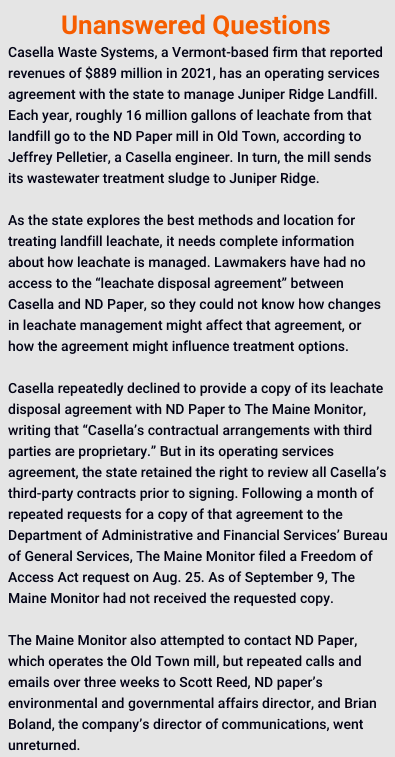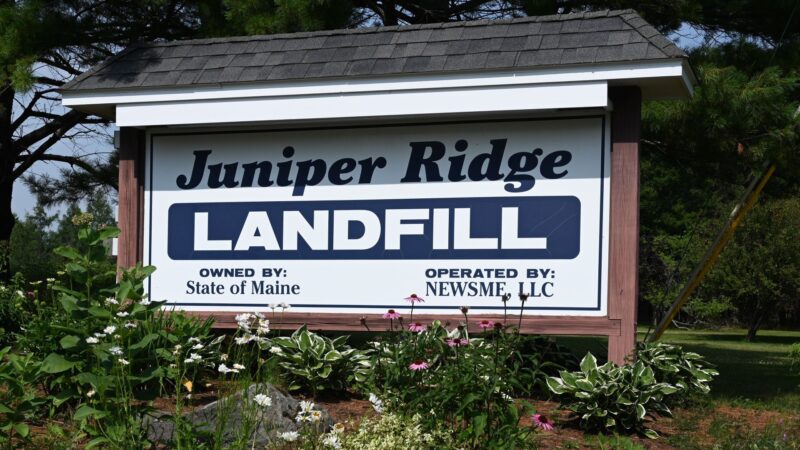As the latest round of PFAS legislation took shape last winter, members of the Penobscot Indian Nation realized the proposed ban on land application of sludge and sludge-based compost, LD 1911, would redirect much of the state’s PFAS-contaminated sludge to the state-owned Juniper Ridge Landfill, located in Old Town near the Penobscot Reservation.
The Tribe supported that legislation, said Daniel Kusnierz, water resources program manager for the Penobscot Indian Nation, but sought to ensure that landfill leachate — the rainwater that percolates through waste — is treated for PFAS before getting discharged into the Penobscot River.
In response to concerns from the Penobscot Nation and the Maine-based nonprofit Defend Our Health, Rep. Stanley Paige Zeigler (D-Montville) sponsored a bill that sought to ensure PFAS treatment occurred on leachate generated at Juniper Ridge Landfill and Dolby Landfill, another state-owned facility, located in East Millinocket.
Following work sessions and extensive discussions, members of the Legislature’s Environment and Natural Resources Committee voted to amend the bill to an emergency resolve, requiring the Department of Administrative and Financial Services’ Bureau of General Services (BGS) to conduct a study assessing the best means for reducing PFAS in leachate at those two landfills through treatment on- or off-site. The study, due back to the Legislature in January, must assess the feasibility, time frame and “anticipated associated costs to the state or to the operators of the landfills” of both on- and off-site leachate treatment options.

Other states have undertaken similar assessments of the most promising and affordable approaches to treating leachate for PFAS. In 2019, Vermont requested that landfill owner Casella Waste Systems undertake a contracted study of leachate treatment options and costs, which was completed by a national engineering firm. The Vermont Department of Environmental Conservation then hired a different national firm to review and evaluate those recommendations.
In Maine, parameters for the study process were not discussed, Zeigler said, with the Legislature “allowing the agency in good faith to put it out (to bid).”
Last month, legislators were surprised to learn from The Maine Monitor that BGS received a proposal for the study from Cumberland-based Sevee & Maher Engineering nearly three weeks before Gov. Janet Mills signed LD 1875, and the firm’s discussions with the bureau had begun, according to its cover letter, two weeks before that. The proposal was subsequently converted into a contract to complete the study, the bureau confirmed. While the fiscal note for LD 1875 indicates that the bureau anticipated a cost of $50,000 to $75,000, the proposal capped a time and materials budget at $111,000.
Sevee & Maher Engineering has long-standing ties with both active state-owned landfills, raising concerns among lawmakers about whether the study will be objective. It holds a contract with the state to operate, monitor and maintain Dolby Landfill, dating from 2018, and the state has paid $1.96 million, according to the bureau.
At Juniper Ridge Landfill, where Casella is responsible for operational and closure/post-closure costs, Shelby Wright, Casella’s Eastern region manager of engagement, wrote that “Casella does have a current and long-standing agreement with Sevee & Maher for engineering services.”
In an email response to questions, the bureau’s spokesperson wrote that it “hired Sevee & Maher Engineers to conduct the research study since they have extensive experience in landfill and wastewater operations and maintenance, and are currently under an annually renewed contract with the state providing landfill and wastewater treatment engineering for the state for Dolby Landfill operations.” The bureau did not answer whether it perceived a conflict of interest in hiring a party that has existing financial contracts at both state-owned landfills. A principal at Sevee & Maher referred questions from The Maine Monitor to the bureau.
“It is important that we get a good study in order that the best process for removing PFAS from the Juniper Ridge’s leachate be used,” Zeigler wrote in an email. “If there is any impropriety in the process, we will address the issue when the study comes to us in the Legislature. The most important thing is that we get the process going to protect the Penobscot River.”
Sen. Richard Bennett (R-Oxford), another committee member, expressed concern about the lack of competitive bidding and potential conflicts of interest, wanting to know “why they were qualified, how they were chosen.”
The bureau’s choice of Sevee & Maher also concerned Kusnierz of the Penobscot Nation. “It doesn’t quite fit right,” he said. “I can understand you’d want to have someone familiar with the facility, but I thought it would be an independent specialist.”
“In general, the consulting industry doesn’t publicize their knowledge … because they can’t bill for that time, and it doesn’t help them competitively,” said Jean MacRae, a professor of civil and environmental engineering at the University of Maine. “So as in many situations where specialized knowledge is involved, it is difficult (and more costly) to get a really independent view on the matter.”
This project was produced with support from the Doris O’Donnell Innovations in Investigative Journalism Fellowship, awarded by the Center for Media Innovation at Point Park University in Pittsburgh, Pa.





